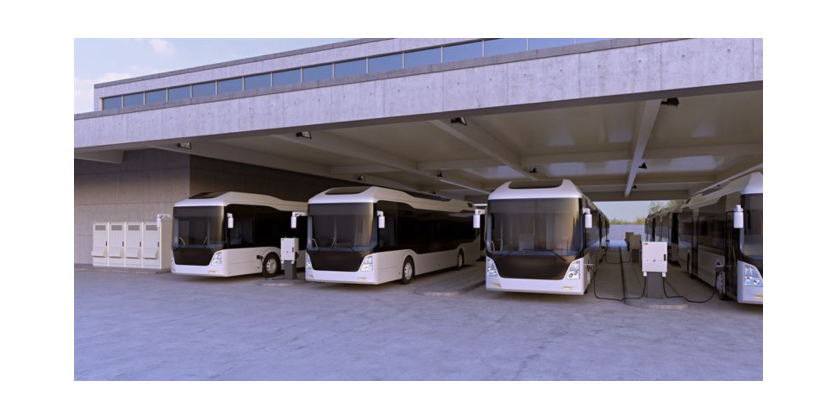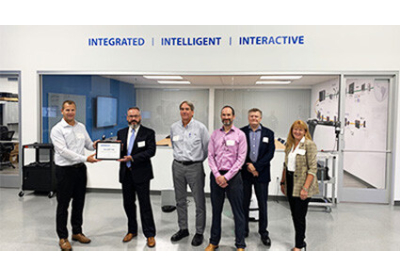ABB E-Mobility Unveils HVC360, the Next Evolution in Fleet Charging Solutions
June 5, 2023

- New ABB E-mobility power cabinet unveiled on World Environment Day will economize and expedite electrification of transport and logistics fleets
- Best-in-class power density and flexible, future proof design supports up to four charging stations simultaneously, helping bus and truck fleets decarbonize
- Despite comprising just 4% of vehicles, buses and trucks contribute a staggering 40% of global transport emissions
ABB E-mobility has announced details of its new HVC360 fleet charging solution, putting the power to drive change in the hands of fleet managers everywhere.
With the decarbonization of road transport taking center stage in many nations’ climate policies, recent years have seen huge strides made towards the provision of electric mobility solutions. But while the growing number of public charging points is excellent news for EV drivers, these alone do not meet the needs of electric fleets. Despite comprising just 4% of vehicles, buses and trucks contribute a staggering 40% of global transport emissions, making their rapid electrification a vital step in the decarbonization process.
Slightly fewer than 66,000 electric busses were sold worldwide in 2022, around 4.5% of total bus sales. The electrified share of the bus market is rising quickly, however, by 20% in Europe and 27% in the US, with India accounting for more demand than the US and Europe combined, and the Chinese market acquiring 98% of all e-busses globally1.
With this rapid rise comes significant demand for more flexible and efficient charging solutions to enable e-bus fleets to keep running from the space-restricted urban depots where they are often based. ABB E-mobility’s new HVC360 power cabinet, being displayed this week at the UITP global public transport summit in Barcelona, represents a big step in helping to deliver the crucial solution for depot charging, embracing the complexities of fleet operations rather than forcing them to adapt.
Offering ultimate flexibility for any site layout or use case, each HVC360 power cabinet enables the connection of up to four charging stations as far as 100m from the power cabinet itself, while its proven, compact design allows installation back-to-back, side-to-side, or along a wall.
Dynamic charging capability allows the HVC360 to allocate differing levels of power to each charging station, based on the number of vehicles plugged in or their charging requirements, while the unit also supports all charging interfaces simultaneously, from CCS to pantograph.
Add best-in-class power density, offering remarkable power for its footprint, and the HVC360’s unrivalled ability to allow charging forecourts and fleet depots to offer a range of charging options in one place becomes clear, enabling providers to mix and match the perfect configuration for their user requirements.
Speaking on the launch of the HVC360, Chris Nordh, Global Head of the Fleet & Transit business at ABB E-mobility said: “Today’s launch of the HVC360, on World Environment Day, represents yet further commitment from ABB E-mobility to meet the complex and sometimes operationally rigid needs of bus and truck fleet operators, and comes backed by decades of development and unrivaled field experience.
“Even more impressive than the unit’s exceptional quality and power density are its extraordinary flexibility and interoperability with a wide range of OEMs, making it a truly global solution. We are very excited to see how HVC360 helps customers of all shapes and sizes to reduce their running costs and emissions as the heavy vehicle sector catches up to the excellent progress already made in the electrification of passenger vehicles.”
Chris Nordh, Global Head of the Fleet & Transit business at ABB E-mobility
Another example of HVC360’s global near-term potential can be found in the haulage industry. Nearly 60,000 medium- and heavy-duty electric trucks were sold worldwide in 20222, just 1.2% of the truck market as a whole. But with the sector continuing to expand at a CAGR (Compound Annual Growth Rate) as high as 47.5%3, global sales are expected to surpass 1.1 million4 per year by the end of the decade. Such rapid growth will be necessary to meet the ambitious climate goals of many nations around the world, but can only be achieved if supported by flexible, efficient charging infrastructure, both en-route and in depots.
Accessibility, however, only goes so far if a solution doesn’t meet evolving requirements. Future-proofing technology of this scale is therefore crucial, and the flexibility of the HVC360 ensures it will be easier for fleet operators to adapt as EVs continue to evolve.
As significant as the HVC360 hardware itself, therefore, is the scale of the ABB E-mobility support system which underpins it. The digital tools and services available for remote management and installation, combined with several layers of services and support, provide a superior customer experience. In addition, energy management solutions enable optimal charging performance and energy consumption, helping bus and truck fleets to operate more efficiently both now and in the future.
ABB E-mobility’s HVC360 will be available in CE and UL markets at the end of September 2023.
ABB E-mobility’s all new HVC360 is available to view at UITP on booth 6E240 (5-7 June).
Related Story
Research Reveals Energy Concerns Impacting Business Competitiveness, The Workforce and Decarbonization
Research shows that businesses around the world remain concerned about the impacts of energy security and prices, which could be a catalyst for a range of environmental, social and economic ripple effects. According to ABB Electrification’s Energy Insights survey1 of 2,300 leaders from small and large businesses across a range of sectors, 92 percent of respondents feel that the continuing instability of energy is threatening their profitability and competitiveness. Energy costs and insecurity are having a significant impact on the workforce with decreased investment in employees. Business leaders are also concerned about potential impacts of meeting their sustainability targets.


